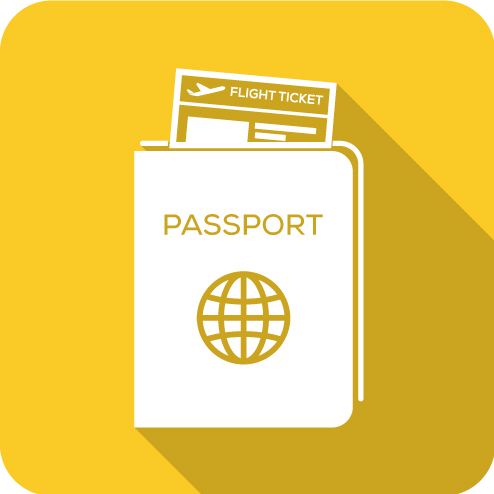The travel industry is undergoing a major transformation, thanks to technology and
the growth of technology-driven business models and shifts in customer and workforce demographics. The rapid advance of digital technologies, the growing impact and scale of nontraditional travel markets, evolving competitive marketplace dynamics, and the rise of new, and often unorthodox, players within the travel ecosystem are fueling massive waves of change.
To thrive in this new environment — especially in emerging travel markets where technology adoption is growing, infrastructure is improving and companies are seeking more international collaboration — the next generation of leaders must
have the capabilities to:
-
Transform their business by leveraging emerging technologies and innovative business models, and by redefining how existing models are executed — both commercially and operationally
-
Lead an increasingly multicultural workforce, serve diverse multicultural guests in all markets, and effectively manage a business system in which formerly emerging markets are rapidly becoming primary ones
-
Tear down divisional silos, integrate business units, promote cross-functional collaboration and, ultimately, increase the agility of the enterprise
-
Empower their teams — particularly those at the front line — with the data and resources they need to make decisions on-site, enabling them to tailor services to enhance each guest experience
-
Forge new partnerships with innovative players both inside and outside of the travel ecosystem to provide an “experience continuum” for customers
-
Build a company culture that encourages new ways of thinking, doesn’t shy away from taking risks and isn’t afraid to “fail fast,” learn from miscues and move on
From our recent conversations with top executives in the airline, hospitality and ground transportation sectors, we identified the top trends poised to make a profound impact on the travel industry over the next decade. In this report, we will review these developments and share perspectives on the challenges — and opportunities — they present. We will also explore what these trends imply for the next generation of leaders, and offer our insights on the capabilities travel leaders will need to shape successful businesses in 2025 and beyond.
What do today’s trends imply for tomorrow’s travel leaders?
In 2025 and beyond, success in the travel industry will be defined in terms vastly different from the definitions of the past — and the key trends emerging in the industry today have far-reaching implications for the next generation of leaders.
What capabilities will the next generation of travel leaders need to drive and sustain successful businesses in the future? As one of the world's premier leadership advisory firms with decades of experience collaborating with travel companies across the world, Spencer Stuart sees the following as essential strengths for the next generation of senior leaders:
The ability to “look around the corner” to capture new business opportunities
To outperform traditional rivals — and stave off challenges from new competitors disrupting their markets and business models — the next generation of leaders will need to be skilled in identifying unconventional business opportunities and adept at transforming business models to seize those opportunities.
With an orientation toward learning and innovation, leaders must be outward-facing, constantly monitoring broad consumer and technology trends in addition to sector and competitive changes and carefully considering how they will impact their specific business.
“What’s going to define a great CEO is the ability to really look around the corner, see things that aren’t obvious to the naked eye and understand the potential implications for the business model,” a hotel industry executive said.
A less traditional career path with an all-around view of the business
Because technology is creating more interconnected business models, the most valued leaders will come from less traditional career paths and have experience across more business functions.
Rather than having a traditional background, the most coveted leaders in the future will have an all-around view of the business and direct experience across more areas of the business, particularly in those areas that interact with customers.
“In business today, you’re really interconnected, so you need to have executives who are experts in their area, but also are well-rounded enough to understand who needs to be in the conversation to make decisions quickly,” said a hotel industry executive. “They need to know when to operate as an interdependent team, and when to just let things go to be very independent.”
The ability to analyze data and use insights from data to enhance and accelerate decision-making across the enterprise
As digital technologies continue to reshape and refocus the travel industry, leaders must embrace innovation and understand how to leverage technology to provide a seamless experience throughout the entire customer relationship.
One hotel industry executive explained the shift like this, “It’s not so about much knowing how to operate a hotel as it understanding how you connect to customers in a digitally enabled world, and knowing how you’re going to use technology, data and analytics to improve and enhance the guest experience and ultimately drive business performance.”
A sophisticated understanding of how to analyze data and use insights from data to inform and accelerate business decision-making will give future leaders a distinct competitive advantage. Leaders should have a keen knowledge of — and a demonstrated track record in — how to leverage advanced data analytics to make faster business decisions, particularly those that lead to new business opportunities — all while still creating human connections with the guest.
“You need to let the data speak for itself and use analytical capabilities to identify opportunities that on the surface you wouldn’t necessarily know were there,” said an executive in
the car rental industry.
Leaders looking to deliver a seamless consumer experience can no longer rely on the top-down approach to decision-making historically used in the travel industry. Instead, they must be ready, willing and able to delegate decision-making across the entire enterprise, especially to teams who have direct contact with customers.
This means that leaders should be ready to “democratize” their data — and give front-line employees access to the information they need to make business decisions in a less hierarchical way.
“What we need are leaders, servant leaders primarily, who understand that their job is to not only make sure they are supporting the front line and giving the front line the tools they need to go do their jobs, but also making sure the front line understands that's what we're here for — to serve those who serve our customers.”
An awareness of — and appreciation for — diversity in both the workplace and the marketplace
Gone are the days when the battles for market share were fought mostly in traditional western markets. Increasingly, the competition for customers is taking place far away from corporate headquarters in rapidly growing markets like those in Southeast Asia, Latin America, the Middle East and Africa. To come out on top, the next generation of leaders must embrace diversity in all aspects of the business.
“We have an incredibly diverse set of customers, and we need to make sure our leadership and our workforce reflects that same level of diversity of thought and of makeup,” an airline executive explained. “It’s not just doing the right thing; it makes the team so much stronger and able to understand what we need to do to think forward and lead forward.”
As they seek to grow their business in emerging markets, leaders must understand the unique nuances and regional preferences of the customers who live in those markets. They must also be aware of the expectations of people traveling from those markets to other parts of the world. Leaders with experience gained by living and working in emerging markets will be better prepared — and more valued — than those who have not.
A deep understanding of what drives a winning culture
Evolving culture will be a key pillar of the strategic agenda of most travel companies. As they move away from traditional hierarchies and toward models that empower teams across the organization to make the right decisions for customers, leaders will need a deeper understanding of the drivers of culture, and the ability to define a target culture and model desired behaviors.
To thrive in increasingly global and digitally travel ecosystem, successful leaders will be capable of envisioning and shaping a culture that embraces learning and flexibility, purpose and caring, moving away from cultures that emphasize safety, order and authority and rely on traditional hierarchies and processes.
In creating such an environment, leaders must be ready to look beyond traditional performance metrics and be prepared to abandon hierarchical corporate structures and outdated business models. They must be eager to break down silos and promote cross-functional collaboration and decision-making — and ultimately create a company culture that is laser-focused on meeting, if not exceeding, the steadily increasing and rapidly changing expectations of the travel consumer.
“You have to be able to move at a rapid pace, and to do that, you’re going to have to trust your teams and provide them with a level of independent decision-making, but also let them know they can lean back in to get support and advice,” said a hotel industry executive.
In building a winning culture, cross-functional communication and collaboration will be absolutely essential, an airline executive stressed. “There’s no doubt that with the ability to communicate so much more easily today — along with the spread of information and data so quickly — the need to collaborate is so much more important,” the executive said. “You don’t want to have structures that make people go up through a chain of command and then back again to communicate with each other.”
Along with creating a working environment that embraces communication and collaboration, leaders create an open culture that encourages out-of-the-box ideas and welcomes risk — and doesn’t punish people for mistakes that help the organization learn.
“The big shift for us is this ability to ‘fail fast,’” said a car rental industry executive. “In the past, we weren’t good at failure at all. In fact, we didn’t even like talking about it. But failing fast, learning from it, then moving on is the big culture shift we really needed.”
The ultimate goal: Building and sustaining business momentum
With digital technologies and increasing globalization dramatically reshaping the travel industry, the job description of the industry leader is being redefined as well. Though their performance will be benchmarked in a variety of new ways, the next generation of leaders will ultimately be measured by how effectively they can build and sustain business momentum — momentum that creates opportunity and the courage to experiment and take risks.
Why? As one hotel industry executive succinctly put it, “If you’ve got the right momentum going, it does lend itself to success.”
Assessing the next generation of travel industry leaders
How can companies in the travel industry improve their approach to identifying and developing the next generation of senior leadership?
As leadership advisers for more than 60 years, Spencer Stuart has studied leadership in a wide range of contexts, and we have developed an understanding of how to help our clients think about the role of leadership in their organizations, and how to select and develop the senior executives capable of making and sustaining a positive impact on the business.
Based on this understanding, we have created a comprehensive approach to leadership assessment that employs multiple methods to evaluate an individual’s ability to perform, fit and make an enduring impact in a critical leadership role. Our approach includes three proprietary tools:
-
Our Executive Intelligence (ExI®) evaluation measures the dimensions of intelligence that predict performance potential, including an executive’s ability to respond to and effectively lead change. Results are benchmarked against a global database of thousands of the world’s most senior executives collected over the past decade.
-
Our Leadership Capability Assessment evaluates and benchmarks leaders on the six capabilities our research shows are critical to leadership performance: Strategic Thinking, Driving Results, Leading Change, Leading People, Collaborating and Influencing, and Building People Capability.
-
With our Culture Alignment Framework, we help clients assess the alignment of culture and strategy, establish a target culture and evaluate the degree to which leaders are likely to fit with, adapt to and shape culture.
Leveraging these three assessment tools, we are helping organizations across the travel industry to create a leadership development plan — a roadmap for finding the right leaders to drive their success in 2025 and beyond.
AIRLINES
Shifting focus to the overall customer experience

Unlike organizations in many industries these days, airline companies don’t have to fear their core business function will be disrupted, as nothing anticipated can replace the basic delivery medium of safe airplane travel. But airlines that continue to shape their business models solely on moving passengers safely from point A to point B are likely to fall short.
“The airline seat does not dominate the value chain anymore; it is the overall customer experience,” one airline executive told us. “What makes the customer book with us is having more choices than other airlines are able to offer.”
Recent consolidation in the airline industry, combined with improving profits gained through lower fuel prices, have enabled airlines to make much-needed and
much-welcomed investments in their fleets, infrastructure and technology to deliver a better travel experience for customers.
U.S.-based legacy carriers, in particular, have a “pent-up desire” to use technology to enhance the “experience continuum” and lure highly coveted business and international passengers away from their overseas competitors, explained an executive of a leading global airline.
Meanwhile, to level the playing field with discount-fare competitors, legacy airlines are increasing efficiency and reducing costs to better position their business against these disruptors. This includes “cabin segmentation” — offering low-margin economy fares along with traditional fare options and recovering the price difference through ancillary services and fees.
HOTELS
Thinking beyond “heads in beds”’

As they look to expand both at home and abroad, hotel brands continue to face stiff competition from home-sharing companies like Airbnb. To win guests back, brands are transforming their operations to move more decision-making to those on the front line and creating business models aimed directly at delivering a more alluring guest experience.
“You’re going to see the industry continue to consolidate because the ability to invest in technology and in the enterprise at scale is going to be critical to win going forward,” predicted a top hotel industry executive. “Simultaneously, even as the big companies continue to get even bigger, brands are going to have to have meaning to people, as well. Customers today are more discerning than ever before, so you’re going to see
a lot more segmentation take place in the brand portfolio.”
As brands diversify their portfolios to meet the changing — and market-specific — expectations of their guests, they’re finding digital technology to be one of their strongest assets. Increasingly, brands are empowering their front-line teams with the digital tools they need to make decisions on-site rather than having to wait for an answer to come back from corporate headquarters.
Moving more operational control to the front line enables brands to think beyond the traditional “get heads in beds” approach and focus instead on improving and personalizing the overall guest experience, both on-site and off. The most innovative brands are creating new travel ecosystems, partnering with local businesses — such as nearby restaurants, health and wellness facilities, and tours and activities operators — to entice guests looking for more than just a good night’s sleep during their stays.
Hotels brands are also laser-focused on gaining customers in travel markets outside the traditional “home” markets in the U.S. and Western Europe.
As Southeast Asia, Latin America, the Middle East, Africa and similar markets continue to grow in both scale and impact, “you just can’t afford to be one-market-centric anymore,” one hotel executive said.
A colleague agreed, adding that “It’s all about understanding where you can compete effectively based upon your business model.”
GROUND TRANSPORTATION
From Point A to Point B in far different ways

Literally and figuratively, technology continues to steer the ground transportation business into entirely new directions. Much like ride-hailing and car-sharing platforms have already revolutionized how consumers get around today, it appears all but inevitable that driverless vehicles will transform the industry once again.
Predicted to occur within the next decade, the advent of driverless cars represents the biggest supply disruption that any sector of the travel industry will likely face in that time frame. Recognizing the potential disruption, the most innovative enterprises in the sector are preparing to change their business models to meet customers’ needs in what may evolve into an entirely new ground transportation ecosystem.
Meanwhile, as more elements of the traditional car rental experience become automated, companies are realigning their operational models around digital technologies, and reducing and/or re-training their workforces to drive up efficiency and drive down costs in existing operations.
Transportation companies also are looking at ways to open new revenue streams at every link in the ground transportation value chain — including customer acquisition and demand generation, fleet management, price and promotion management, customer service, vehicle purchasing, and vehicle remarketing and recycling. As they do, they are forming partnerships with businesses that specialize in the different links in the chain, such as OEMs, dealers, fleet-management providers and even ride-sharing companies.
“Given the speed of innovation across so many different platforms, we’re seeing real benefit in partnering with companies who can help us accelerate the development and deployment of features that improve — if not revolutionize — the customer experience,” said an executive from a leading mobility company.“
TRAVEL AND TOUR OPERATORS
Building customized options

The rise of online travel booking sites and low-cost airlines has made it easier and less expensive for bargain-hunting travelers to plan and book their own holidays. Meanwhile, the idea of standardized tours is less appealing to a new generation of travel consumers, who want more options and the ability to chart their own course.
In response to consumers’ desire for more flexibility and choice, traditional tour operators are moving beyond offering standardized holiday packages to enable travelers to select specific accommodations and activities. Over time, travel companies will use technology and a wealth of customer data to “tailor the offering to the exact needs of the customer — even when the customer doesn’t know yet what he needs,” said one travel company leader.
Increasingly, travel companies will use technology to bring the trip to life online for travelers planning their trips. Already, companies are using technology to enable travelers to choose their specific rooms in advance of the trip, based on the room layout and its location near amenities such as the pool or the bar, or to reserve sunbeds before departure, knowing where the sun and shade will be over the course of the day.
As they look ahead, travel companies are investing in new technology, forging partnerships with digital players and others to increase offerings, and developing branded properties appealing to modern travelers’ sensibilities.
Travel companies leaders must communicate a clear direction for the business, inspire people across the organization to be curious and innovative and build flexible, collaborative cultures. As one travel leader explained, “If you don’t have a unifying set of values and agreement on a set of targets, you will struggle to move forward and do the right thing.” In addition, future leaders will need to be technology-savvy and equipped to creatively leverage the growing amount of customer data at their disposal, and have experience in multiple travel markets.